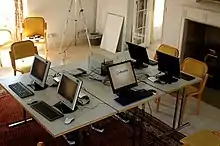Ndiyo
Ndiyo was a not-profit organisation based out of Cambridge, United Kingdom, which aimed to promote networked computing that is "simple, affordable, open." Ndiyo, pronounced nn-dee-yo, is the Swahili word for "yes".[1] The company developed an ultra-thin client called the nivo (network in, video out) based on Ubuntu Linux and other open-source software, for use especially in developing countries. The data sent to the clients over the network was pixel data, using a similar approach to Virtual Network Computing (VNC).

The project worked on the basis of multiple workstations running from a single PC. Quentin Stafford-Fraser, founder of the organisation, told The Economist "We can make computing more affordable by sharing it". The system allows a basic PC running linux to be shared by many users.
The Ndiyo Nivo was similar in concept to Sun Microsystems' Sun Ray virtual display thin client, but at sub-$100 and using only 2W, it was lower-cost and used much less power, making it more suitable for these kinds of situations.
In addition to its use by organisations within the United Kingdom, Ndiyo-based systems were deployed in internet cafes in Bangladesh and South Africa, and in Tanzanian Schools.
The Nivo technology went on to become the basis of DisplayLink, a company founded by members of the team.
References
- "Bab.La". Bab.La. Oxford University Press. Retrieved 9 August 2017.
External links
- Ndiyo!
- The Ndiyo system and the nivo Archived 2008-10-08 at the Wayback Machine
- Video of a 2006 Ndiyo deployment in Bangladesh
- Video of a 2006 Ndiyo deployment in South Africa